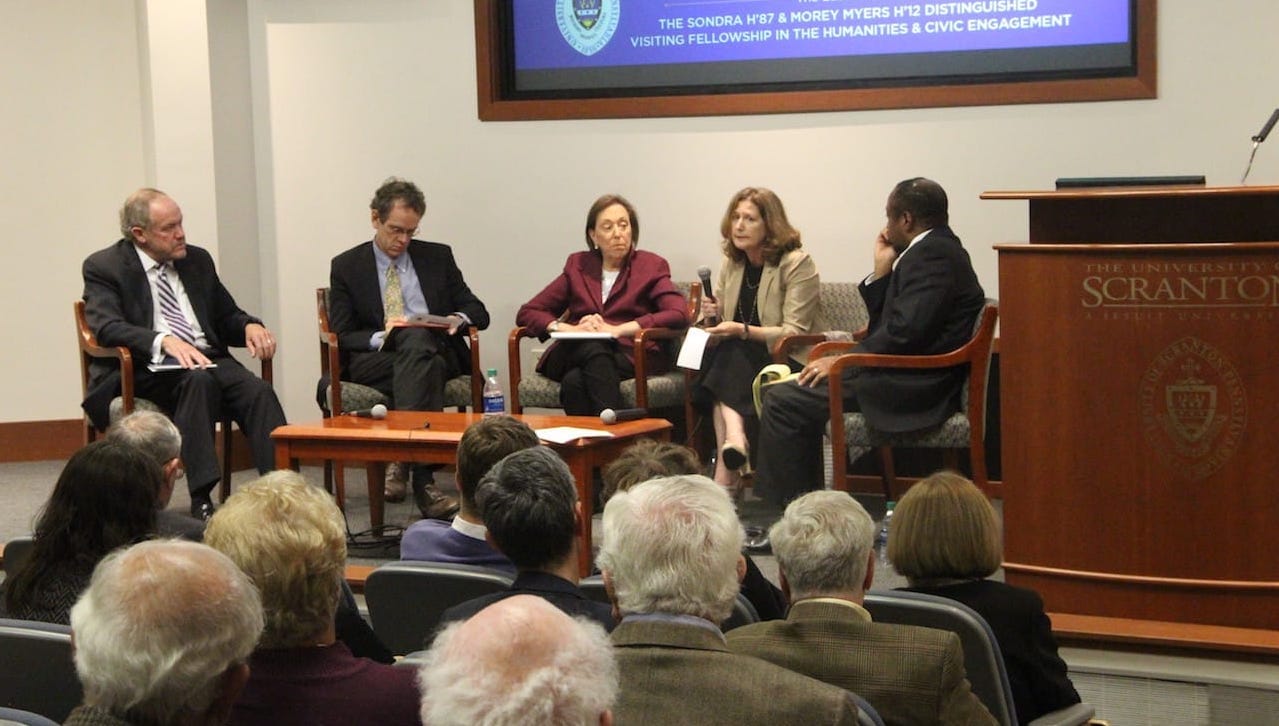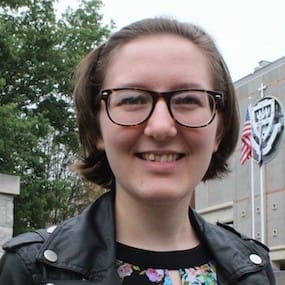Panelists Consider Law, Autocracy and Democracy

The University hosted a day-long series of panel discussions titled “The Crisis of Democracy Today: What Can the Humanities, Law, and Civic Activism Do to Address the Challenge?” as part of the formal launch for the Sondra H’87 and Morey Myers H’12 Distinguished Visiting Fellowship in the Humanities and Civic Engagement. The event took place on campus on Oct. 25.
The last of three-panel discussions on Oct. 25 focused on “How Can Law Address the Crisis of Democracy?” Panelists were: David Cole, J.D., legal director of the American Civil Liberties Union and the Hon. George J. Mitchell Professor in Law and Public Policy, Georgetown University; Nomi Stolzenberg, J.D., Nathan and Lilly Shapell Chair in Law, University of Southern California Gould School of Law; Marcia Greenberger, J.D., founder and co-president emerita of the National Women’s Law Center; and President Judge Michael Barrasse, J.D. ’78, G’78. Michael Fairbanks ’79 H’06, chairman of the board, Silver Creek Medicines and fellow at the Weatherhead Institute for International Affairs at Harvard University, provided the introduction, and Joel Kemp, J.D., Ph.D., assistant professor of theology and religious studies at The University of Scranton, served as moderator.
In his opening remarks, Fairbanks utilized the example of Rwanda as a new, upcoming legal paradigm from which the United States may learn a way to approach its own challenges. “They’ve built something new in the law, and it’s called ‘building modern institutions on traditional values,’” said Fairbanks. “We go over there with fancy notions about privatize and democratize and liberalize, and they’re so smart, they take a tiny bit of what those of us from the West said and then for the rest make up their own path.” Fairbanks also noted that Sondra Myers served an integral role in Rwanda, writing a handbook about their institutions in Rwanda’s official language, Kinyarwanda, so that children could learn about their country in their native tongue.
Following the opening remarks, the panelists introduced themselves with a comment on the state of the American democracy today. Judge Barrasse touched upon recent threats to the rule of law in the United States: “In Pennsylvania – in our city of brotherly love, Philadelphia – we now have a city that has declared itself a sanctuary city, essentially indicating laws that it’s not going to enforce or support.” Likewise, he added, some cities have asserted themselves as Second Amendment sanctuary cities, upholding the right to bear arms over federal law, all of which create a cause for concern. “If a citizen sees government officials choose not to follow law, then why should they?” he said. “Without the rule of law, we will have anarchy to follow.”
Meanwhile, Atty. Cole addressed the institution's autocratic leaders of democratic societies target: namely, the press, non-government organizations, universities and religious institutions. “Why? Because each of these are places where people can come together in pursuit of their views and in check of governmental abuse,” said Atty. Cole. In a democracy where the institutions of civil society are under attack, he continued, the First Amendment is critically important in protecting citizens’ ability to criticize governmental authority, and people have spoken out in response to the threat against it through protests and membership in the ACLU, which has swelled to 1.8 million members. “People recognized the importance of these institution,” Atty. Cole added. “Citizens will be our salvation.”
For Atty. Greenberger, justice cannot be achieved without activism. “As a public interest lawyer, much of my work was to link activism and law, and that remains more true now than ever. In the Me Too movement, which arose certainly after the election, after the Women’s March, women in Hollywood came forward. But what’s not so well-known is that farmworker women contacted those women in Hollywood and told them how proud they were because they understood how hard it was to step forward,” said Atty. Greenberger. “And these women in Hollywood were so blown away that they set up the Time’s Up effort and supported a legal fund that would be available to help women in non-traditional jobs, who were often facing multiple kinds of discrimination, to have access to the law. That’s how getting those stories out made a difference.”
Atty. Stolzenberg called attention to a grave threat to democracy: the war against secularism. “In the United States, we have a long tradition of religious war against secularism by Protestant and Evangelical Christian groups, as well as some conservative Catholic discourse,” she said, “but what’s new is that anti-secularists now occupy unprecedented levels of power.” Using Attorney General William Barr’s speech at the University of Notre Dame, Atty. Stolzenberg illustrated the ways in which anti-secularists attack secularism: “They say secularism destroys traditional morals, that it’s discrimination against their religious liberty. This is a discourse that is very dangerous to democracy.”
Following their opening remarks, the moderator asked the panelists questions as did audience members. The program concluded with brief closing remarks by Sondra and Morey Myers.
The Sondra H’87 and Morey Myers H’12 Distinguished Visiting Fellowship in the Humanities and Civic Engagement, housed in the University’s Slattery Center for the Humanities, will help to advance the University’s efforts to bring renowned scholars, artists, and thinkers to Scranton to share their work and enrich cultural and civic activity at The University and in Scranton.







